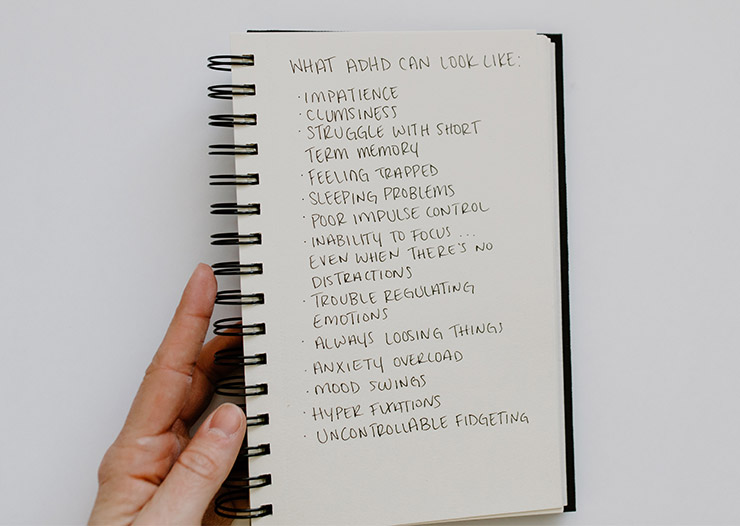What ADD/ADHD Looks Like in Everyday Life
ADHD, or Attention-Deficit/Hyperactivity Disorder, manifests in various ways in everyday life, presenting both challenges and unique characteristics. Individuals with ADHD often struggle with maintaining focus and attention, leading to difficulties in completing tasks, organizing activities, and sustaining attention to details. They may exhibit forgetfulness, being easily distracted by external stimuli or internal thoughts. Additionally, impulsivity is a common trait, causing individuals to act without thinking through consequences, interrupt conversations, or have difficulty waiting their turn. Hyperactivity is another aspect, resulting in restlessness, fidgeting, and a constant need for movement. These challenges can impact academic and occupational performance, as well as social relationships. However, it is important to note that individuals with ADHD also possess strengths such as creativity, flexibility, and a unique perspective on problem-solving. With proper support, including structured environments, effective time management strategies, and behavioral interventions, individuals with ADHD can thrive and reach their full potential.

How we can help with ADHD
Counseling can play a crucial role in helping individuals with ADHD manage their symptoms and improve their overall well-being. Here are several ways in which counseling can be beneficial:
- Education and Understanding: Counseling provides an opportunity for individuals with ADHD to gain a better understanding of their condition. Counselors can explain the nature of ADHD, its symptoms, and how it affects various aspects of life. This knowledge helps individuals develop self-awareness and reduces feelings of frustration or self-blame.
- Skill Development: Counseling can equip individuals with ADHD with practical strategies and skills to better manage their symptoms. This may include techniques for improving focus and concentration, developing organizational and time management skills, and learning effective coping mechanisms for impulsivity and hyperactivity.
- Emotional Support: Living with ADHD can bring about emotional challenges such as frustration, low self-esteem, and anxiety. Counselors provide a safe and non-judgmental space for individuals to express their feelings and concerns. They can help individuals develop healthy coping mechanisms, build self-confidence, and work through any emotional difficulties related to ADHD.
- Behavior Modification: Counselors can assist individuals in identifying and modifying unhelpful behaviors associated with ADHD. Through cognitive-behavioral therapy (CBT) techniques, individuals can learn to recognize and challenge negative thought patterns, develop strategies to improve impulse control, and implement effective problem-solving skills.
- Goal Setting and Planning: Counseling helps individuals with ADHD set realistic goals and develop action plans to achieve them. Counselors can assist in breaking down larger tasks into manageable steps, creating routines, and implementing strategies for staying organized and focused.
Relationship and Social Skills: ADHD can affect relationships and social interactions. Counseling can address challenges related to communication, impulse control, and maintaining healthy relationships. Individuals can learn effective communication skills, social cues, and strategies to manage ADHD symptoms within social contexts.
Overall, counseling provides a supportive and collaborative environment for individuals with ADHD to address their challenges, develop effective strategies, and enhance their overall quality of life. It is important to work with a counselor experienced in treating ADHD to ensure personalized and effective interventions.
How do you know you may have ADD?
- Do you interrupt a lot?
- Does it take you longer than necessary to complete tasks?
- Do you daydream excessively?
- Do you make impulsive decisions?
- Extremely disorganized
We can help Treat your ADD/ADHD in the following ways:
- Becoming more organized
- Reducing impulsivity
- Completing/initiating tasks in an efficient manner
- Emotional Regulation
Therapists for Treating ADD/ADHD in Oklahoma
At Cedar Tree Counseling in Oklahoma, we understand the challenges individuals with ADD/ADHD face on a daily basis. Our dedicated team of experts specializes in providing effective treatment and support for those struggling with ADD/ADHD. Through a personalized and comprehensive approach, we offer therapeutic techniques such as cognitive-behavioral therapy and mindfulness practices, to help manage symptoms and improve overall well-being. Whether you or a loved one are seeking guidance for coping strategies, or educational support, we are here to empower you on your journey towards a balanced and fulfilling life. Take the first step today and reach out to Cedar Tree Counseling to discover the transformative possibilities that lie ahead.